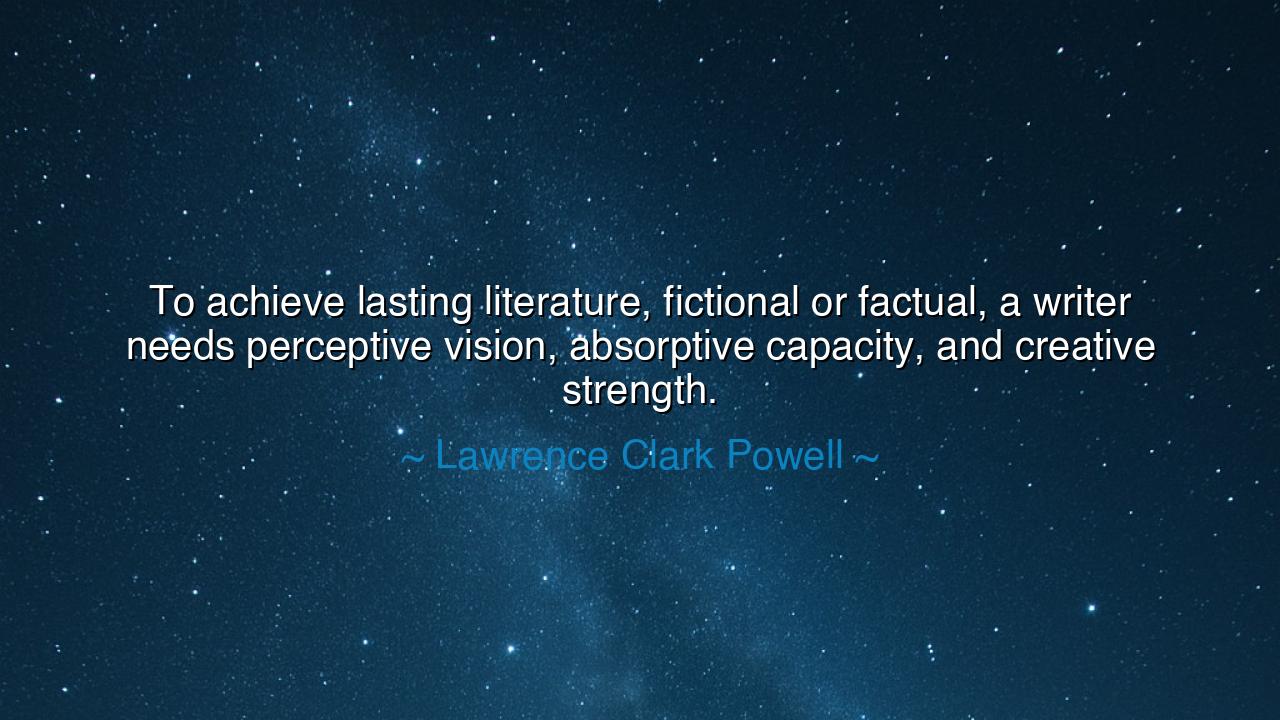
To achieve lasting literature, fictional or factual, a writer
To achieve lasting literature, fictional or factual, a writer needs perceptive vision, absorptive capacity, and creative strength.






Hear the words of Lawrence Clark Powell, the librarian-scholar, who preserved the wisdom of ages and nourished the seeds of new thought. He declared: “To achieve lasting literature, fictional or factual, a writer needs perceptive vision, absorptive capacity, and creative strength.” These words, though spoken in the realm of letters, reach into the very heart of human creation. For literature, whether it springs from the imagination or from the careful record of truth, must be built upon foundations deeper than ink and paper—it must arise from the soul’s ability to see, to gather, and to shape.
When Powell speaks of perceptive vision, he reveals the writer’s first task: to see the world not as it appears to the distracted eye, but as it truly is in its depths. This vision penetrates beyond surfaces, perceiving meaning in the smallest gesture, hearing harmony in the ordinary voice, catching glimpses of eternity in the fleeting moment. Without this vision, words are shallow; with it, words become revelation. It was such vision that allowed Dostoevsky to look into the heart of human guilt, or Emily Dickinson to find infinity in a single flower.
He then speaks of absorptive capacity, the power to take into oneself the experiences, ideas, and stories of the world. A writer must be like a river, gathering streams from many hills, drawing into their spirit the thoughts of others, the pulse of history, the rhythms of culture. This is not mere imitation, but absorption: a process by which the writer’s soul digests all that is seen and heard, transforming it into something new. Shakespeare possessed such a gift—he borrowed plots from chronicles and legends, yet absorbed them so fully that they emerged as living works more eternal than their sources.
The third pillar Powell names is creative strength—the power to forge, to shape, to breathe life into the vision and the absorbed material. Strength is required because creation is labor, a birth that demands endurance. Many see, many absorb, but few have the will to carve words into form with patience and power. This strength is not only physical persistence, but the resilience of spirit that endures rejection, failure, and long nights of solitary work. It is the strength that enabled Tolstoy to pen War and Peace, or Herodotus to craft his histories, both fictional in color and factual in purpose, yet enduring for centuries.
History itself confirms Powell’s wisdom. Consider the life of Victor Hugo, who envisioned a society bound by justice and mercy, absorbed the pain of the poor and the broken, and through creative strength gave birth to Les Misérables. His work was not merely a story but a mirror of humanity, both timeless and transformative. Literature such as this survives because it springs not from fashion or vanity, but from vision, absorption, and creation bound together in harmony.
The deeper meaning of Powell’s teaching is that lasting literature cannot be manufactured quickly, nor can it be built from cleverness alone. It requires the fullness of a writer’s humanity—the eyes to see, the heart to receive, the will to create. Such writing endures because it reflects not only the age in which it was written but also the eternal truths that bind all generations together.
The lesson for us, O seeker of words, is plain: if you would write works that endure, cultivate these three qualities. Train your vision by observing deeply, not skimming over life but gazing into its hidden meanings. Enlarge your capacity by reading widely, listening earnestly, and experiencing life with openness. Strengthen your creative force by practicing discipline, enduring difficulty, and shaping your words with care. For it is only when these three unite that literature takes root in the soil of eternity.
So let Powell’s wisdom echo in your heart: “A writer needs perceptive vision, absorptive capacity, and creative strength.” These are the three pillars of enduring art. Build upon them, and your words, whether fiction or fact, may outlast your breath, carrying your soul’s vision into the ages to come.






AAdministratorAdministrator
Welcome, honored guests. Please leave a comment, we will respond soon